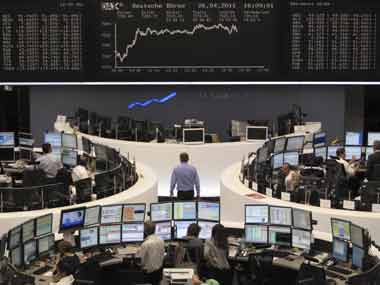Anyone investing in equity markets in 2012 will, in addition to investment wisdom, also need a political reckoner.
That’s because politics - that ceaseless churn that symbolises the triumph of hope over experience - will drive markets in 2012 even more than they generally do.And it’s not just about nebulous policy decisions by governments that could influence markets.
Over the next year, as many as 12 countries and/or administrative regions around the world - which collectively account for 50 percent of the world’s economy - will either go in for national elections or see leadership transitions.
[caption id=“attachment_134262” align=“alignleft” width=“380” caption=“Anyone investing in equity markets in 2012 will, in addition to investment wisdom, also need a political reckoner.”]
 [/caption]
[/caption]
The countries/administrative regions that will see elections or leadership transitions are: Spain, Taiwan, Egypt, Finland, Russia, Hong Kong, France, South Korea, Mexico, Venezuela, and finally the US. In addition, Greece and Italy could also face elections, but there is no certainty on that.
Some of these elections will be fought on campaign themes with rival contenders embracing economic philosophies that are poles apart; consequently, who wins and who loses will determine policy outcomes and worldviews that have a momentous impact.
Given the range and sweep of these changes, these leadership transitions coming up in 2012, and the politics surrounding them, have the potential to dramatically alter the investment dynamics around the world.
A recent research report from JP Morgan analyses the many ways in which politics will influence the markets in 2012.We offer here a snapshot of their analysis to explain how politics will drive markets next year.
Impact Shorts
More Shorts**US.**In many ways, the US presidential elections are the most significant, and given the economic crossroads that the world’s largest consumer economy is in, the outcome will have a profound impact. Barack Obama, once a darling of the US electorate, is running for a second term, but finds his charm considerably diminished. There is a sense of voter disillusionment with both the leading parties. The downgrade of the US credit rating earlier this year counts as a political liability for Obama - although much of the economic mess that led up to it was the work of the earlier administration. Obama’s foreign policy credentials have been bolstered by the killing of Osama Bin Laden and the sagacity with which he dealt with the Libyan uprising. The JP Morgan report points out that no US president since FD Roosevelt in 1936 has been re-elected with the unemployment rate running at over 8 percent. Depending on who comes to power, policies on government spending on healthcare, decisions on corporate and individual income tax could differ widely, and have a dramatic impact on markets.
**China.**China isn’t a democracy, but it’s in line for a political change of enormous significance. And the next generation of leaders will be the first ones not to have been handpicked by Deng Xiaoping, the architect of the Chinese economic miracle. And although the leadership change in China is characterised byan orchestrated shuffling of leaders, it will also see an ageing top leadership give way to young blood. Seven of the current nine members of the Party’s Central Committee Politburo Standing Committee will probably retire along with 16 of 25 members of the Politburo. How these new leaders position their US policy will be crucial. If trade friction with the US mounts, it could spill over onto the political realm as well. How well the new generation of leaders deal with the pressures of economic nationalism and mounting mass unrest will be important for global markets.
France. The government structure in France works like this: the president is directly elected by people. But the party that he belongs to may not have a majority in the assembly (lower house) or the senate (upper house). In that case, the prime minister could hold greater authority than the president. Current president Nicholas Sarkozy’s party now has a majority in the assembly but not in the senate. Sarkozy’s opponent is campaigning on the theme of strengthening the domestic economy and the need to raise more revenues for higher public spending. But all eyes will be on France’s sovereign rating: if that slides, the electorate might want the leader to concentrate on the state rather than help out fellow eurozone members. It is here that politics will come face-to-face with investors.
**Spain.**Spain is currently ruled by Zapatero who will not contest elections to be held this November; the current deputy prime minister, Rubalcaba, will be the candidate. The main opposition party is the People’s Party (PP), under the leadership of Rajoy. Zapatero has taken various austerity measures for a year now, but despite these, the deficit may end at 8 percent of GDP. If Zapatero wins, the austerity measures are likely to continue, aggravating the problem of unemployment and rising social unrest. Spain is in that sense a bellwether eurozone economy that could determine the fate of the European Union and the larger global financial markets.
Egypt. Egypt saw a momentous political transition earlier this year when Hosni Mubarak was driven out of office by huge protests and an uprising that turned violent. The Supreme Council of the Armed Forces (SCAF), consisting of 20 senior officers in the Egyptian military, was handed power when Mubarak left; the Council is expected to hold power until a new president is elected. If the newly elected body shows a leaning towards the former government, that could lead to further disruptions. If uncertainty persists, it could impact the price of oil, which in turn could drive investment sentiment for better or for worse in 2012.
)